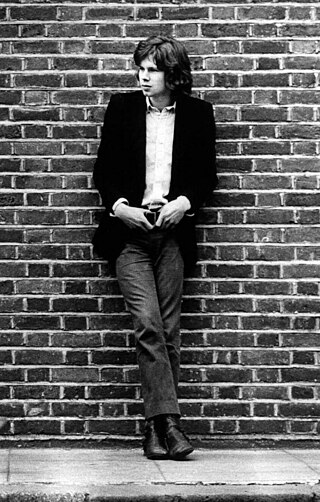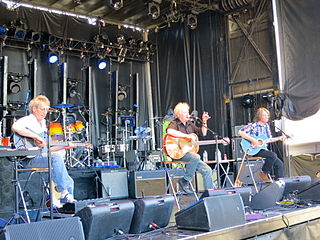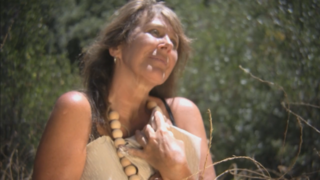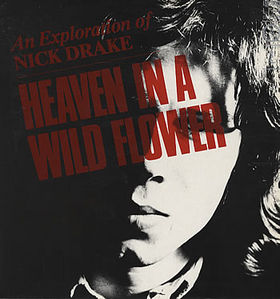
David James Mattacks is an English rock and folk drummer, best known for his work with British folk rock band Fairport Convention.

Nicholas Rodney Drake was an English musician. An accomplished acoustic guitarist, Drake signed to Island Records at the age of twenty while still a student at the University of Cambridge. His debut album, Five Leaves Left, was released in 1969, and was followed by two more albums, Bryter Layter (1971) and Pink Moon (1972). While Drake did not reach a wide audience during his brief lifetime, his music found critical acclaim and he gradually received wider recognition following his death.

Dave Pegg is an English multi-instrumentalist and record producer, primarily a bass guitarist. He is the longest-serving member of the British folk rock band Fairport Convention and has been bassist with a number of folk and rock groups including the Ian Campbell Folk Group and Jethro Tull.

Pink Moon is the third and final studio album by the English musician Nick Drake, released in the UK by Island Records on 25 February 1972. It was the only one of Drake's studio albums to be released in North America during his lifetime. Pink Moon differs from Drake's previous albums in that it was recorded without a backing band, featuring just Drake on vocals, acoustic guitar and a single piano melody overdubbed onto the title track.

The Strawbs are an English rock band founded in 1964 as the Strawberry Hill Boys. The band started out as a bluegrass group, but eventually moved on to other styles such as folk rock and progressive rock.

Jennifer Vashti Bunyan is an English singer-songwriter. She began her career in the mid-1960s and released a debut album, Just Another Diamond Day, in 1970. The album sold very few copies and Bunyan, discouraged, abandoned her musical career. By 2000, her album had acquired a cult following; it was re-released and Bunyan recorded more songs, initiating the second phase of her musical career after a gap of thirty years. She released two more albums, Lookaftering in 2005, and Heartleap in 2014.

Bryter Layter is the second studio album by English folk singer-songwriter Nick Drake. Recorded in 1970 and released on 5 March 1971 by Island Records, it was his last album to feature backing musicians, as his next and final studio album, Pink Moon, had Drake perform all songs solo.

Just Another Diamond Day is the debut album by the English folk singer-songwriter Vashti Bunyan, and was released on Philips Records in December 1970. Much of the album is a musical reflection on Bunyan and travelling partner Robert Lewis's experiences while travelling by horse and wagon through Scotland in 1968. It highlighted Bunyan's vocals with minimal instrumental accompaniment that was arranged by contemporary musical artists supervised under record producer Joe Boyd.

The discography of Nick Drake, an English folk musician and singer-songwriter, consists of three studio albums, five singles, seven compilation albums, two box sets, one video album and various soundtrack and compilation appearances.

Way to Blue: An Introduction to Nick Drake is a 1994 compilation album featuring tracks by English singer/songwriter Nick Drake, taken from his original three albums plus Time of No Reply. The album reached gold certificate in the U.K. on 30 September 1999 after selling 100,000 copies. In United States in the year 2000 sales have jumped to 67,916 units.

"Northern Sky" is a song from the English singer-songwriter Nick Drake's 1971 album Bryter Layter, produced by Joe Boyd. During the recording sessions for the album, the chronically shy and withdrawn songwriter formed a friendship and a mentorship of sorts with producer Joe Boyd, an early supporter of Drake. Boyd saw commercial potential in the acoustic and unaccompanied demo version of the song, and recruited former Velvet Underground member John Cale as producer. Cale added piano, organ and celesta arrangements, initially against Drake's wishes.

Akuma no Uta is the fifth album by Japanese experimental music band Boris. Originally released in 2003 on Diwphalanx Records with minimalist artwork, it was re-issued in 2005 on Southern Lord Records with a different cover and more music.
Antilles Records was a record label founded as a division of Island Records. It began as a jazz label, recording Joanne Brackeen, Biréli Lagrène, and Phil Woods, though its catalogue did expand to include eclectic musicians like Brian Eno and Robert Fripp. It was the first to introduce the Slits and Nick Drake to American audiences. One of its founders was Jeff Walker, an employee at Island and the first A&R director for Antilles.

Heaven in a Wild Flower is a 1985 compilation album featuring tracks by English singer/songwriter Nick Drake, taken from Five Leaves Left, Bryter Layter and Pink Moon. The title of the compilation is taken from the lines of William Blake poem Auguries of Innocence. The album does not feature any of Drake's posthumously released material and because of the availability of more comprehensive compilations, such as Way to Blue and Fruit Tree, this collection is largely out of print.

"Magic" is the second listed song from Nick Drake's 2004 compilation album Made to Love Magic and was remastered and released as a single in 2004. The single was released on both CD and vinyl record formats, with Bryter Layter track "Northern Sky" as a B-side.

Nick Drake is an American-only LP compilation release by English folk musician Nick Drake. It was released in August 1971 as SMAS-9307, shortly after Island Records had started selling their own records in the U.S. At the time, they were distributed by Capitol Records.

A Treasury is a Nick Drake compilation aimed at the audiophile audience. Released in the UK on 27 September 2004 and in the US on 26 October 2004, it was available as both a hybrid multichannel SACD and a 180 gram vinyl LP. To promote the compilation, a single was issued for the song "River Man", released on CD and 7" vinyl in the UK on 13 September 2004.
Raymond Kenneth Warleigh was an Australian alto saxophonist and flautist.

Stroll On is the debut album by British singer-songwriter Steve Ashley. It was released in April 1974 in LP format on Gull Records and was critically acclaimed in the UK, being awarded “Contemporary Folk album of the Year” in the leading monthly folk magazine, Folk Review. It has been described as "a masterful, beautifully textured and gentle epic" and "a masterpiece of its kind – a beautiful, rich and deeply atmospheric collection of very English songs, like a musical impression of Dickens, Victorian Christmas cards and Thomas Hardy’s Wessex with a running concept concerning seasonal change". According to the music collectors' magazine Goldmine, it is "one of the key albums in the entire history of English Folk Rock".

















